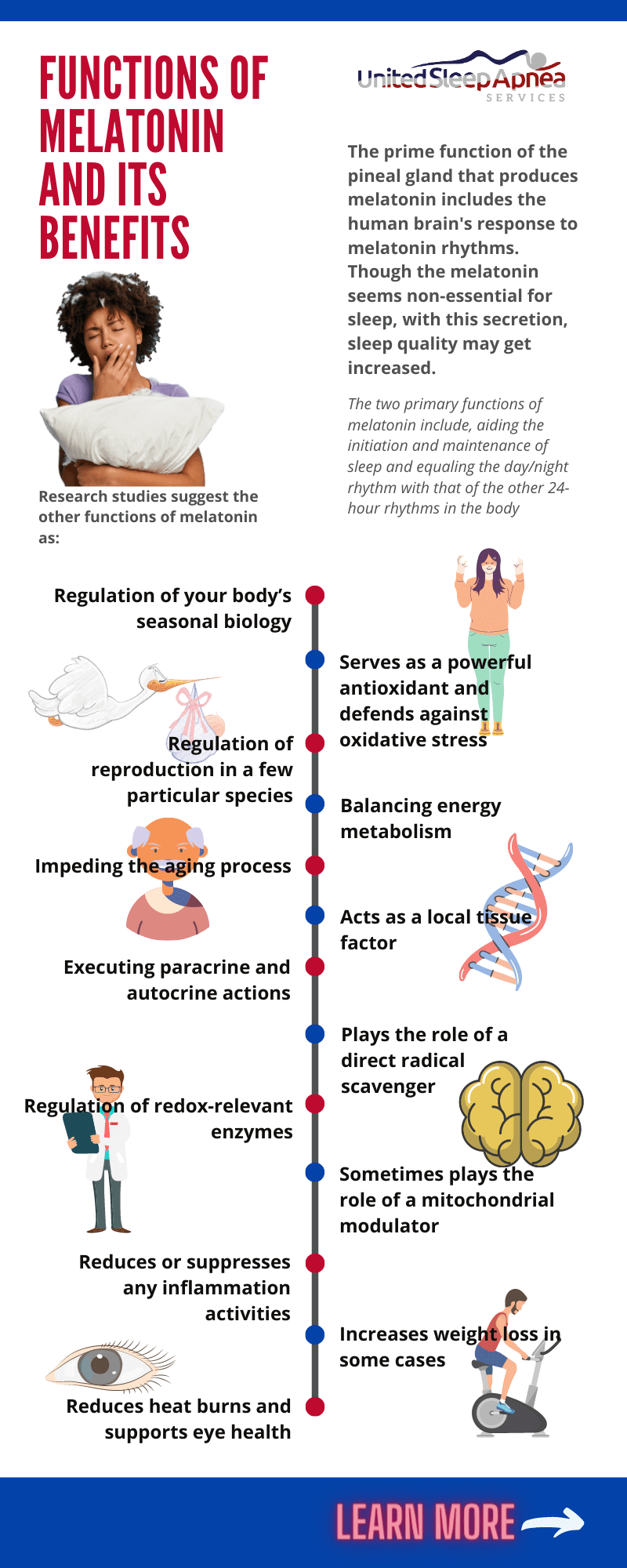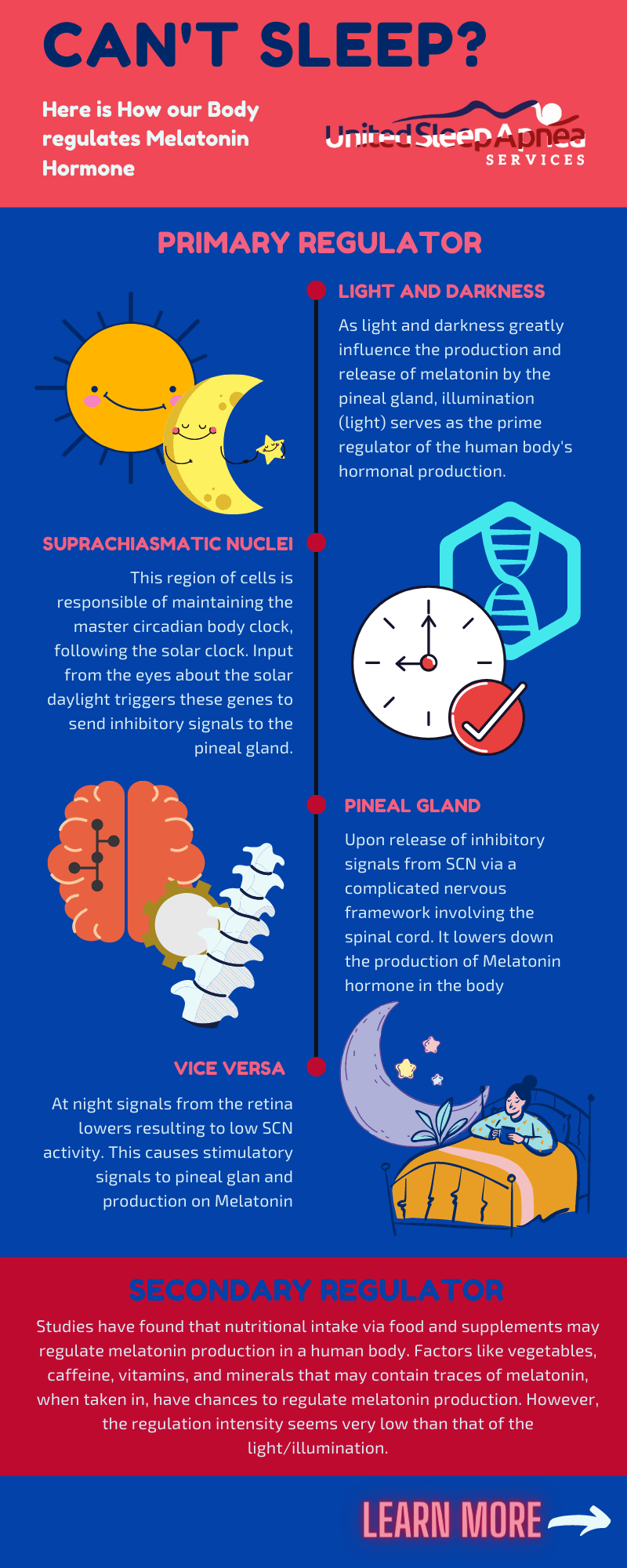Melatonin, a natural and endogenous hormone produced in a human body, promotes sleep and helps in aligning with the body’s circadian rhythm. Referred to as the sleep hormone, melatonin becomes the central part of an individual’s sleep-wake cycle.
A tiny, pea-shaped gland in the brain called the pineal gland produces Melatonin. The production increases with the commencement of darkness (night) and decreases with the light illumination (daytime). In this way, the hormone regulates the circadian rhythm of sleep and regulates the sleep-wake cycle between day and night.
In general, melatonin levels experience a seasonal effect or rhythm based on the arrival of seasons. During Autumn and Winter, the nights get longer, and hence the melatonin level increases. Whereas during Spring and Summer, the condition is vice versa, and hence the melatonin level decreases.
When melatonin production occurs within a human body, it refers to endogenous melatonin. Rather, when melatonin production occurs outside a human body (synthetic preparations), it refers to exogenous melatonin. Sometimes, the extraction of melatonin from other mammals (animals) takes place. This also refers to endogenous melatonin as it is a living organism that produces the hormone.
Production of Endogenous Melatonin Hormone
 In specific, the brain tissue, the pineal gland, has the machinery to produce melatonin from the amino acid, tryptophan. After production, the hormone is released into the fluid around the brain called cerebrospinal fluid and into the bloodstream. These mediums carry the melatonin to various organs and parts throughout the body.
In specific, the brain tissue, the pineal gland, has the machinery to produce melatonin from the amino acid, tryptophan. After production, the hormone is released into the fluid around the brain called cerebrospinal fluid and into the bloodstream. These mediums carry the melatonin to various organs and parts throughout the body.
Though brain tissues contribute to the major production of melatonin, scientists also observed the production of melatonin by other body cells, namely astrocytes, gut, skin, glial cells, reproductive organs (testes, ovary), lymphocytes, retinal cells, and placenta. Next to the pineal gland, melatonin released by the astrocytes and glial cells accounts for the highest (peak) levels found in the central nervous system. But, the largest organs that produce melatonin in the human body include the skin and gut.
Research findings claim that the level of melatonin produced in the nighttime proves to be 10 times higher than the level of melatonin produced during the daytime.
The secretion of the hormone varies with age, so as you grow older, it is important that you get a good nights’ sleep. The initiation of melatonin secretion begins from the third or fourth month of life. The secretion rapidly increases with the growth of the child until three to four years. Later, a slight reduction in secretion occurs and prolongs for years. Above the age of 50, people sometimes face health concerns, due to melatonin deficiency.
Functions of Melatonin and its benefits
The prime function of the pineal gland that produces melatonin includes the human brain’s response to melatonin rhythms. Though the melatonin seems non-essential for sleep, with this secretion, sleep quality may get increased.
The two primary functions of melatonin include,
● Aiding the initiation and maintenance of sleep
● Equaling the day/night rhythm with that of the other 24-hour rhythms in the body
Research studies suggest the other functions of melatonin as:
● Regulation of your body’s seasonal biology
● Serves as a powerful antioxidant and defends against oxidative stress
● Regulation of reproduction in a few particular species
● Balancing energy metabolism
● Impeding the aging process
● Acts as a local tissue factor
● Executing paracrine and autocrine actions
● Plays the role of a direct radical scavenger
● Regulation of redox-relevant enzymes
● Sometimes plays the role of a mitochondrial modulator
● Reduces or suppresses any inflammation activities
● Increases weight loss in some cases
● Reduces heat burns and supports eye health
We’re on Pinterest, Facebook, Instagram, and Twitter! Follow us now!
Regulation of Melatonin Hormone
Primary Regulator: Light
As light and darkness greatly influence the production and release of melatonin by the pineal gland, illumination (light) serves as the prime regulator of the human body’s hormonal production.
The regulatory mechanism of melatonin secretion as a whole follows a master circadian clock. In general, humans have a region of cells called the suprachiasmatic nuclei (SCN) in the brain. This region takes the responsibility of maintaining the master circadian body clock. The genes expressed by this region tend to oscillate throughout the day (follows the solar cycle). When these genes get input from the eyes (retina) about the solar daylight, these genes send inhibitory signals to the pineal gland via a complicated nervous framework involving the spinal cord. Thus, melatonin production seems lowest during the solar day.
Vice versa, when these genes fail to get signals from the retina (during night darkness), the lowest activity of the suprachiasmatic nuclei occurs. This causes stimulatory signals to pass via the nervous system to the pineal gland, resulting in increased melatonin production at night. As usual, the body prepares for sleep when the melatonin-receptors are active due to the hormone’s circulation throughout the body.
Secondary Regulators: Nutrient Intake
Studies have found that nutritional intake via food and supplements may regulate melatonin production in a human body. Factors like vegetables, caffeine, vitamins, and minerals that may contain traces of melatonin, when taken in, have chances to regulate melatonin production. However, the regulation intensity seems very low than that of the light/illumination.
Even in this case, the lower rate of regulation by nutrient intake during the daytime doesn’t greatly affect the nocturnal melatonin production at nighttime.

Melatonin Abundance: How much is too much
The secretion of melatonin in abundance is not very common amongst individuals. Only in some individuals, there may be a slight increase in its production. In this case, individuals may feel drowsiness often. Other side effects may include a negatively affected reproductive system, reduced core body temperature, and increased antioxidant effect.
In this case;
● Individuals may feel drowsiness often
● Other side effects may include a negatively affected reproductive system
● Reduced core body temperature
● Increased antioxidant effect
Melatonin Deficiency
The endogenous production of melatonin by the pineal gland may get affected by distinct factors like age, the state of suffering from other diseases, and human-intervened actions or lifestyles.
● Age-based Deficiency
In innate mode, the nocturnal melatonin production attains its peak at night and comes down during the day.
With aging, researchers found that melatonin levels tend to get reduced. This causes a deficiency in the nocturnal melatonin production primarily. The daytime melatonin production further gets lowered due to the age factor. This is important to know and ensure you are able to get quality sleep at night. The effects if you don’t could lead to other diseases.
In some cases, it makes the levels of nocturnal and daytime melatonin production almost equal.
● Disease-based Deficiency
Studies have observed deficiencies in melatonin production in patients who already suffer from Alzheimer’s disease (a neurodegenerative disorder), diabetes type 2, cancer, dementia, and mood-based disorders.
● Human Interventions
Owing to changing lifestyles, humans tend to intervene in melatonin production. Usage of gadgets and electronics at night brings in nocturnal illumination. This illumination at night proves to contract with the solar daylight cycle, affecting the suprachiasmatic nuclei’s regulatory signals to the pineal gland. Thus, purposeful human interventions become one of the factors to cause melatonin deficiency.
With any kind of melatonin deficiency, one common symptom in almost all humans—includes sleep disturbances.
Concerned about your melatonin levels
due to not getting enough quality sleep? Don’t worry! Consult with our experts…
The Relationship between Melatonin and the Sleep-Wake Cycle
The sleep-wake cycle of your body is one of the many circadian rhythms that your body follows. The circadian period of individuals may vary between 23.8 to 27.1 hours. Your daily sleep-wake cycle depends on several factors. The most important factor includes the working of an endogenous clock called the suprachiasmatic nucleus (SCN). The SCN neurons present across your body organs, work on a 24-hour rhythmic cycle and perform its signaling function to respective hormone producer cells like the pineal gland and pituitary gland.
Darkness at evening and night induces the pineal gland to produce melatonin. When this hormone is detected by the melatonin-receptor cells present across the body, it prepares itself for sleep mode. The daylight or illumination inhibits the pineal gland in producing melatonin. In this case, melatonin-receptor cells’ lack of signal stimulates the body to prepare itself for the wake mode.
In the case of a human body failing to produce enough melatonin to aid in the normal sleeping mechanism, the hormone intake has to happen in the form of a supplement to keep-up the sufficient levels. However, when taking a supplement, several factors need immediate attention and should be studied exclusively. Always consult with a physician prior to taking melatonin supplements.
Melatonin and Sleep Disorders
As melatonin improves sleep quality, it has opened up huge opportunities in the realm of sleep loss and sleep-disordered patients. However, the inverse effects of sleep disorders with the hyper or hyposecretion of melatonin do not yet have strong research evidence.
Insomnia
In general, the insomniac patients suffer from sleep initiation problems, and they cannot fall asleep. Like endogenous melatonin, exogenous melatonin can also induce sleep mood in insomnia patients and increase their sleeping efficiency by binding with the melatonin-receptors.
Sleep Apnea
Research findings show that obstructive sleep apnea syndrome (OSAS) strongly correlates with the nocturnal melatonin peak values. The patients suffering from OSAS exhibit lower nocturnal melatonin levels lower than the usual peak values. This indicates the delay of peak accomplishment in OSAS patients (peak occurs around 6 am instead of 2 am). This abnormal melatonin secretion may lead to the severity of the sleep apnea condition and cause daytime mental fatigue.
Exogenous melatonin supplements via clinical trials proved to reduce the side effects of sleep apnea patients. With the help of exogenous melatonin, the overall effects of cardiovascular issues, depression, and type-2 diabetes in sleep apnea patients are surpassed.
Melatonin also modulates autophagy, decreases cardiac contractility, lowers blood pressure, and inhibits the expression of inflammatory cytokines in the sleep-breathing disorder patients with sleep disorders.
Hypersomnolence
This disorder makes the individuals feel excessive daytime sleepiness in addition to sufficient nocturnal sleep. Melatonin supplements alter these patients’ sleep architecture and circadian rhythm and help them overcome their daytime sleep mood.
Hypoxia-Related Hyperglycemia
Research shows the promising effect of melatonin in hypoxia-related hyperglycemia patients. The study results also prove the prevention of intermittent hypoxia in these patients. Scientists believe that this may have arisen due to the antioxidant effect of melatonin.
Circadian Rhythm in Sleep-Wake Disorder
Synchrony of the innate circadian rhythms takes place in these patients. Desynchrony in these patients affects their melatonin secretion levels. However, exogenous melatonin supplements can help in increasing the propensity of the misaligned circadian rhythm.


